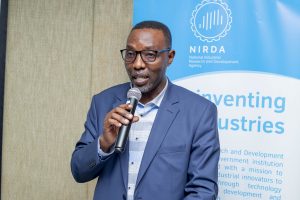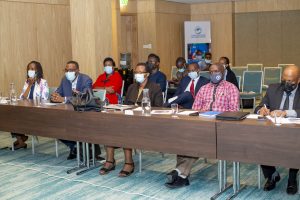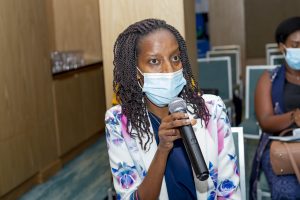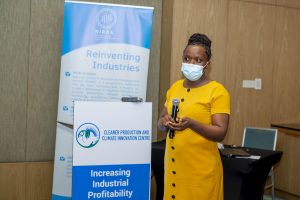Kigali, Rwanda ,the High Level Business Meeting on increasing industrial profitability and driving the Circular Economy agenda in Rwanda was lead by National Industrial Research & Development Agency (NIRDA) of Rwanda and Rwanda Cleaner Production and Climate Innovation Centre. supported by the Global Green Growth Institute (GGGI) Rwanda and Rwanda Environment Management Authority (REMA) through the Green Climate Fund (GCF) Readiness and Preparatory Support Project. The meeting was held to discuss how local industries and SMEs can efficiently use available resources, improve waste management, and reduce their environmental footprint, and as an opportunity for all of the participants , stakeholders and partners to renew their commitment to green industrial production.
The GCF readiness projects implemented in Rwanda are expected to have an impact of strengthened Rwanda’s Institutional Capacities, governance mechanisms, and planning and programming frameworks to support the achievement of Rwanda NDCs to Paris Agreement and identification of a transformational long-term climate action agenda. The GCF readiness currently under implementation, aims at Institutional capacity and coordination mechanisms in place to govern and coordinate climate action and finance at the national and subnational level leading to the delivery of climate actions in their respective sectors, subsectors, and communities.
In this regard, the CPCIC was supported in terms of Development of cleaner production technologies/climate innovations, systems, and practices for knowledge sharing including but not limited to:
1)Development and delivery of the CPCIC’s stakeholders’ engagement strategy in line with the center’s five years strategic plan,
2) Development of new stakeholder’s engagement and awareness creation products and channels (websites and social media platforms, corporate brochure, newsletters etc,) and
3) Develop and deliver a nation awareness creation campaign inclusive of this high-level business meeting.

The Cleaner Production and Climate Innovation Center (CPCIC) making the case for circular economy and green growth is part of Rwanda’s effort to build a sustainable economy that puts the environment and climate change at the heart of all its policies, programs and plans. The CPCIC replaced the Rwanda Resource Efficient and Cleaner Production Center (RRECPC), which was established in 2008 and was instrumental in mobilizing local industries and SMEs to adopt cleaner and greener technologies and practices over the past decade. The Centre works to ensure that the country meets its green growth ambitions and to deliver technical support, policy advice, technology transfer, and training that promote resource efficiency, cleaner production, the circular economy, and climate technologies. Over the past years, the Centre has worked with public and private institutions, – including government institutions, industries, SMEs and organizations across the country- to put in place systems that guarantee that resources are used sustainably. The Centre works across diverse sectors, touching the areas of food, textiles, tea and coffee, beverages, plastic packaging and many more. Over the past decade the CPCIC collaborated with over 54 industries and SMEs and dozens of institutions to streamline water and energy use, promote efficient use of resources, minimize – and where possible eliminate- waste, ensure high productivity, create green jobs and maximize profitability while mitigating the damage being inflicted on our planet.

The business meeting was able to draw from the achievements made over the past few years to further discuss ways of achieving more on the journey towards green growth and sustainable development. The meeting brought together high-level officials from the private and public sectors, experts and key stakeholders to discuss best ways of embracing and driving the circular economy agenda in Rwanda. It was also an opportunity to discuss the new mission, vision, objectives and operations of the new center – and how it can better contribute to greening industries, advancing resource efficient and cleaner production, promoting circular economy and industries symbiosis, and driving innovation for climate resilience and adaption. This meeting was considered critical in raising awareness about the Centre and creating an enabling environment for accountability, promote participatory and collaborative processes and encourage adoption of resource efficiency, cleaner production, the circular economy, and climate technologies.
Specifically the meeting objectives were to:
– Introduce participants to the CPCIC and its Corporate objectives,
– Discuss the work of the CPCIC to advance circular Economy in Rwanda
– Discuss collaborative mechanisms to advance circular economy and industrial symbiosis
– Share experiences, lessons and best practices for green growth.
The Director General of the National Industrial Research and Development Agency (NIRDA) Dr. Christian Sekomo Birame urged industry players, SMEs, private and public institutions to embrace the circular economy as it enables growth, protects the environment and boosts productivity. Dr. Sekomo was speaking during the high level meeting on the Cleaner Production and Innovation and Climate Innovation Centre (CPCIC) on how to increase industrial productivity and drive the circular economy in Rwanda. The meeting brought together participants from industries, SMEs, Public and Private Institutions. “Circular economy enables growth, increased productivity for our industries, creation of green jobs that our population needs and environment sustainability. It is a win-win situation that everyone of us should embrace,” he said. Sekomo told participants that the Cleaner Production and Climate Innovation Centre (CPCIC) was established with the aim to help industries, SMEs , public and private institutions to adopt best practices in terms of resources efficient, cleaner production, circular economy and innovation. “As we discuss how local industries and SMES can efficiently use available resources, improve waste management, and reduce their environmental footprint, we must renew our commitment to green industrial production,” he added. He stressed that over the past few years, NIRDA and the Cleaner Production and Climate Innovation Centre and a range of other partners, have been implementing programs to optimize and scale-up sustainable and climate resilient management of natural resources, Green Growth and Climate Resilience Strategy in select sectors.

The Cleaner Production and Climate Innovation Centre (CPCIC) is at the heart of Rwanda’s effort to ensure circular economies across all sectors a move which seeks to ensure that people, institutions, organizations and companies embrace new practices that eliminate waste and trash from their production and development processes; and adopt practices that put development in harmony with nature. That’s the green growth that Rwanda aspires to achieve. These sectors, he said, include public institutions, Civil Society Organizations (CSOs) and the private sector. “These activities are aimed to support Rwanda’s ambitions of achieving green growth: becoming a developed nation that achieves growth without compromising the environment,” he said. “The Government of Rwanda has put in place strategies, plans and policies to drive this development. It is our role to make sure that we join this journey and support these efforts,” assured Dr. Sekomo“ over the years, we have proved that we can grow, increase production and at the same time reduce emission and contribute to environment sustainability. It is the time to scale it up for even much more gains. NIRDA is committed to keep supporting Industrial Green Growth through the center and other activities to ensure that our industries develop and that our environment does not become the victim of that development,” he concluded.
Beatrice Cyiza, Director General for Environment and Climate Change at the Ministry of Environment, told participants that moving from the linear to a circular model of development entails changing practices, adopting new processes and approaches to production and consumption. She said: “Embracing circular economy bring the changes we all aspire for, as we strive for sustainable development. It must start with me and you, and collectively we will achieve bigger impact.” Among key actions to undertake, Cyiza noted, include reducing waste and eliminating them where possible, introducing recycling practices, proper waste management practices as well as efficiently using resources.

Liliane Mupende, of the Global Green Growth Institute (GGGI Rwanda) said: “We have so much waste that we can work with to turn into new products [and] or one industry, or one SME can feed into one another; providing waste to serve as raw materials to another. The challenge that we must solve is to create strong linkages between waste generators and recyclers so they can be processed into new products and to create networks that allow SMEs, start-ups and industries to drive circular economies.” “The CPCIC and other institutions are doing a commendable work in terms of circular economies. What’s next is now to scale the work to create the desired impact.”
The Cleaner Production and Climate Innovation Centre was created in 2018 with a vision of becoming a center of excellence and merit for Resource efficient, Cleaner Production, Climate Innovation Technologies and Prosumer Economy in Rwanda. It replaced the Rwanda Resource Efficient and Cleaner Production Centre (RRECPC) which was merged with the planned Climate Innovation Centre.
According to Sylvie Mugabekazi, a Technical Expert at the CPCIC, the Centre has been instrumental in supporting industries, SMEs and organizations to improve their productivity, benefits and contributions to environment protection over the past years. For instance, she said, since 2008 industries working with the Centre reduce over 30,000 tons of Carbon dioxide (CO2) every, 41million megajoules (MJ) of electricity and over 22,300 tons of solid waste. The efforts have also contributed to the reduction of 241,952 Cubic meters of wastewater per year while 153,175 cubic meters of water are saved per year. Economically, $6,579,962 total savings were registered against $5,185,805 of investment since 2008, she said.

The Director General for Environment and Climate Change Cyiza Beatrice concluded the meeting by thanking all participants for their participations, inputs and experiences shared and encouraged further collaboration and investment in circular economy and cleaner production processes to achieve green growth in Rwanda.